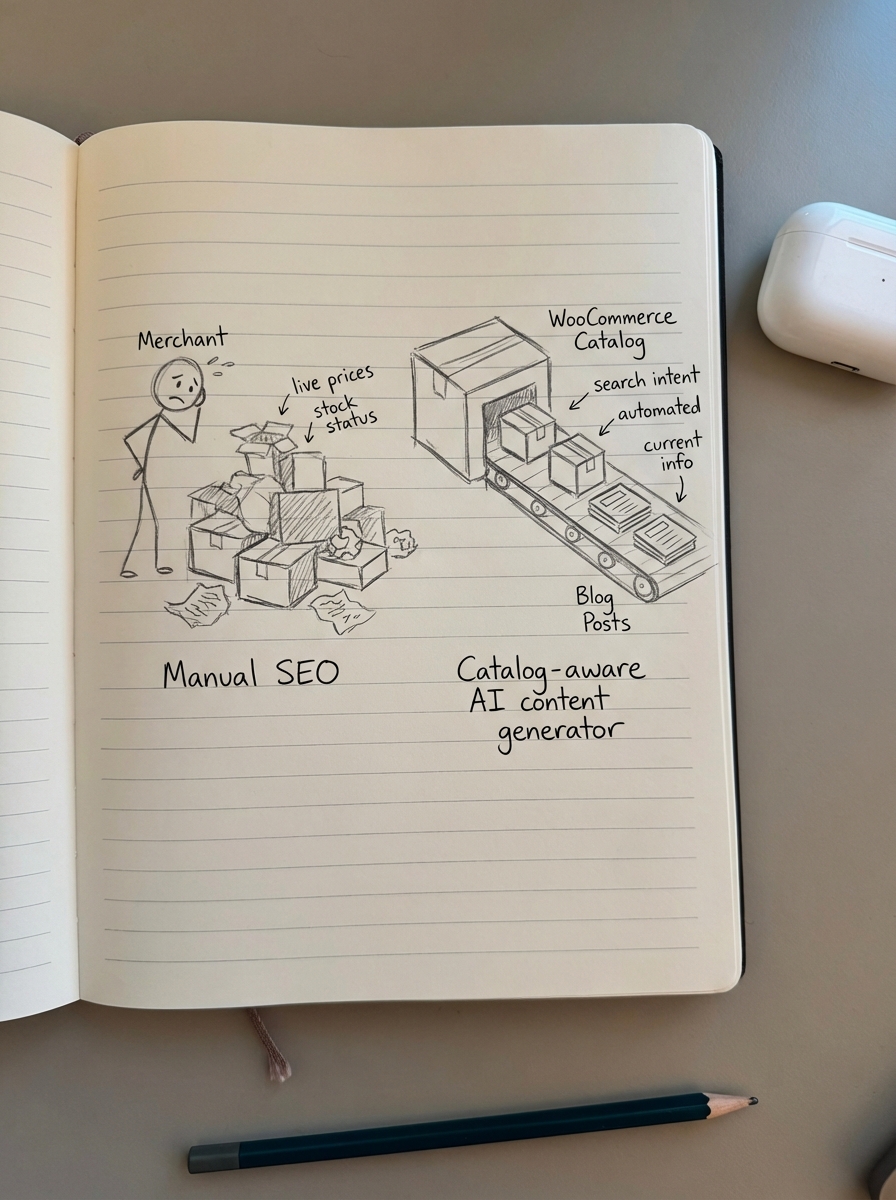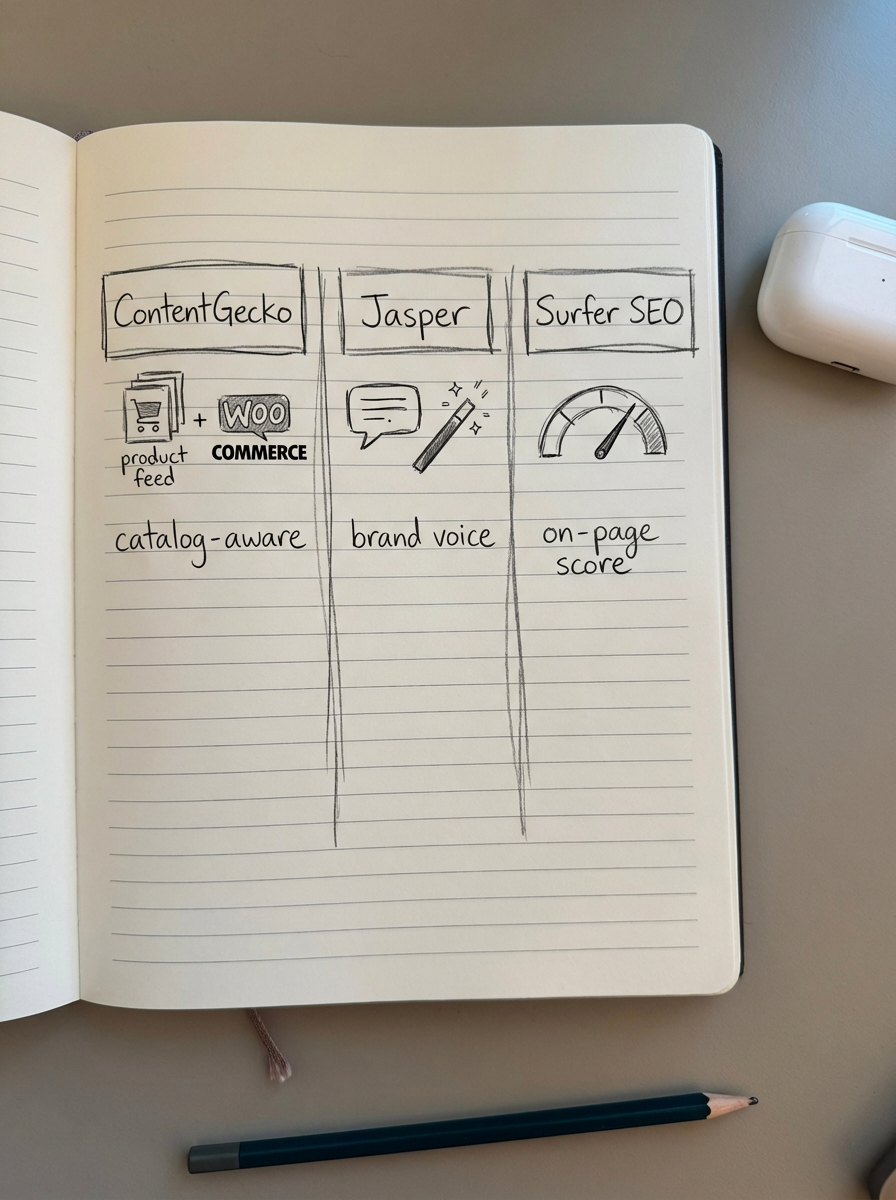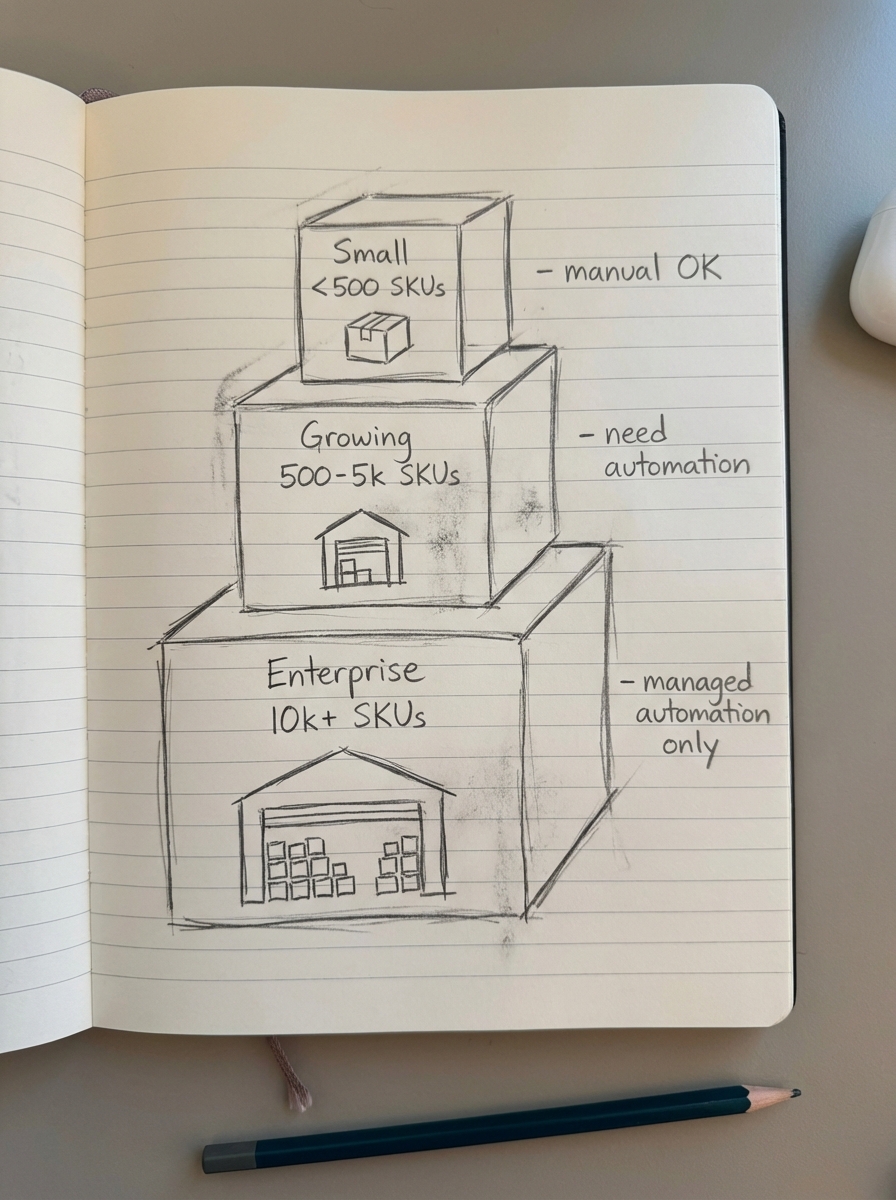Best AI content generator for SEO
The best AI content generator for SEO isn’t the one that writes the most words; it’s the one that integrates your live product data with search intent to create a self-updating content ecosystem. Most merchants fail at SEO because they treat AI like a faster typewriter, when they should be treating it like an automated inventory manager for their blog. If you are running a WooCommerce store with more than 500 SKUs, manual content production is a losing game. By the time you’ve finished a listicle, several products are likely out of stock or have seen price changes. You need a tool that understands your catalog, not just the English language.
Why traditional AI generators fail ecommerce stores
Most popular tools are built for general marketing copy. They are excellent for overcoming blank-page syndrome, but they lack what I call “catalog awareness.” I’ve seen dozens of stores use generic copywriting software to produce outputs that rank for a few weeks, then plummet because the content becomes technically inaccurate. When your blog recommends a product that is no longer in stock, your bounce rate spikes, and Google stops trusting your domain as an authoritative source.

For SEO to work at scale, your content generator must go beyond simple text generation. It needs to sync with your SKUs to pull real-time price and stock status and understand search intent to avoid content cannibalization. Furthermore, it should use a WordPress connector plugin to link blog posts to high-margin products without manual intervention. Without these connections, you aren’t building an SEO strategy; you’re just creating a maintenance nightmare.
Top AI content generators for SEO compared
ContentGecko: The catalog-aware choice
ContentGecko is built specifically for WooCommerce merchants who want a fully automated SEO workflow. Unlike generalist tools, it plans and writes content by syncing directly with your product feed. It is designed for stores with 500+ products and teams that want to scale without hiring an army of writers. The key differentiator here is real-time updates. If a product goes out of stock, the system replaces it with an in-stock alternative in your published articles. We offer tiered plans tailored to everything from growing stores to enterprise-level operations with over 10,000 products.
Jasper: The generalist “Swiss Army knife”
Jasper remains an industry standard for short-form copy and creative drafting. It offers hundreds of templates for everything from LinkedIn posts to marketing emails. While it features excellent brand voice customization, it lacks direct integration with WooCommerce catalogs. In my experience, this makes it a strong tool for creative teams, but a heavy lift for SEO managers who have to manually update and publish every piece. It’s a great draft assistant, but it isn’t an automation engine.
Surfer AI: The on-page specialist
Surfer SEO focuses on the gamification of search engine optimization. It analyzes top-ranking pages and provides a “score” based on how many times you use specific terms. While it is useful for building topic clusters, I’ve found that strictly following its recommendations often leads to robotic content. These tools operate on the premise that matching a competitor’s word count and keyword density is enough, but they frequently miss the original insight required to rank in a post-AI search landscape.

The contrarian workflow: Iterate content like product
I firmly believe the most common SEO mistake is trying to make every AI article perfect before publishing. In ecommerce, speed is your primary competitive advantage. You should iterate on your content the same way you iterate on a product launch. Start by launching an “MVP” article. You can use an AI SEO content writer to produce a solid, fact-checked piece based on current search intent.
Once the content is live, use an ecommerce SEO dashboard to monitor which pages are actually gaining impressions. If an article starts ranking in the top 20, that is the signal to invest human time in adding proprietary data or custom photography. I also suggest ignoring meta descriptions entirely; by 2026, Google will be rewriting them for almost every query anyway. Your focus should instead be on keyword clustering tools to ensure your articles aren’t competing against one another for the same user.
Why category pages are your low-hanging fruit
While most searchers look for AI generators to write blog posts, the real ROI for WooCommerce merchants is in their category pages. Optimizing category names is often a far more effective use of resources than writing a new blog. Most stores use vague names like “Accessories” or “Gear,” which do nothing for search visibility.
A specialized generator should help you pivot these to specific, buyer-friendly terms like “Waterproof Hiking Accessories.” Once the category is optimized, you can use seo content automation to build supporting blog content that links back to that category. This builds topical authority that a single product description simply cannot achieve.
How to choose the right tool for your scale
Your choice of a content generator depends entirely on your SKU count and technical resources. We generally recommend the following breakdown for WooCommerce merchants:
- Small Stores with under 500 SKUs: You can likely manage with a free writer or standard LLM if you have the time to manually manage links and copy-paste content into WordPress.
- Growing Stores with 500 to 5,000 SKUs: You require automated internal linking and a tool that handles SERP-based keyword clustering to keep your strategy from becoming bloated and redundant.
- Enterprise Operations with 10,000+ SKUs: Manual updates are a physical impossibility at this scale. You need a platform that offers managed automation to keep your content synced with a constantly shifting catalog.

TL;DR
Stop looking for an AI writer and start looking for a content automation system. If you use WooCommerce, ContentGecko is the only solution that syncs with your catalog to provide self-updating, conversion-focused articles. For general marketing copy, Jasper remains a versatile choice, while Surfer SEO is best for those who want to granularly score on-page terms. Always prioritize category page optimization and keyword clustering over bulk-producing unlinked blog posts.
